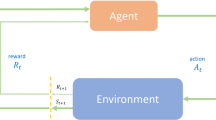Abstract
With the rapid development of Artificial Intelligence (AI), an increasing number of Machine Learning (ML) technologies have been widely applied in many aspects of life. In the field of education, Intelligence Tutoring Systems (ITS) have also made significant advancements using these technologies. Developing different teaching strategies automatically, according to mined student characteristics and learning styles, could significantly enhance students’ learning efficiency and performance. This requires the ITS to recommend different learning strategies and trajectories for different individual students. However, one of the greatest challenges is the scarcity of data sets providing interactions between students and ITS, for training such ITS. One promising solution to this challenge is to train “sim students”, which imitate real students’ behaviour while using the ITS. The simulated interactions between these sim students and the ITS can then be generated and used to train the ITS to provide personalised learning strategies and trajectories to real students. In this paper, we thus propose SimStu, built upon a Decision Transformer, to generate learning behavioural data to improve the performance of the trained ITS models. The experimental results suggest that our SimStu could model real students well in terms of action frequency distribution. Moreover, we evaluate SimStu in an emerging ITS technology, Knowledge Tracing. The results indicate that SimStu could improve the efficiency of ITS training.
Access this chapter
Tax calculation will be finalised at checkout
Purchases are for personal use only
Similar content being viewed by others
References
Bouhnik, D., Marcus, T.: Interaction in distance-learning courses. J. Am. Soc. Inform. Sci. Technol. 57(3), 299–305 (2006)
Brusilovsky, P.: Adaptive hypermedia for education and training. Adapt. Technol. Training Educ. 46, 46–68 (2012)
Chen, L., et al.: Decision transformer: reinforcement learning via sequence modeling. arXiv preprint arXiv:2106.01345 (2021)
Choi, Y., et al.: EdNet: a large-scale hierarchical dataset in education. In: Bittencourt, I.I., Cukurova, M., Muldner, K., Luckin, R., Millán, E. (eds.) AIED 2020. LNCS (LNAI), vol. 12164, pp. 69–73. Springer, Cham (2020). https://doi.org/10.1007/978-3-030-52240-7_13
Chrysafiadi, K., Virvou, M.: Student modeling approaches: a literature review for the last decade. Expert Syst. Appl. 40(11), 4715–4729 (2013)
Corbett, A.T., Anderson, J.R.: Knowledge tracing: modeling the acquisition of procedural knowledge. User Model. User-Adap. Inter. 4(4), 253–278 (1994)
Horntvedt, M.E.T., Nordsteien, A., Fermann, T., Severinsson, E.: Strategies for teaching evidence-based practice in nursing education: a thematic literature review. BMC Med. Educ. 18(1), 1–11 (2018)
Kang, W.C., McAuley, J.: Self-attentive sequential recommendation. In: 2018 IEEE International Conference on Data Mining (ICDM), pp. 197–206. IEEE (2018)
Kasurinen, J., Nikula, U.: Estimating programming knowledge with Bayesian knowledge tracing. ACM SIGCSE Bull. 41(3), 313–317 (2009)
Khajah, M., Lindsey, R.V., Mozer, M.C.: How deep is knowledge tracing? arXiv preprint arXiv:1604.02416 (2016)
Li, Z., Shi, L., Cristea, A., Zhou, Y., Xiao, C., Pan, Z.: Simstu-transformer: A transformer-based approach to simulating student behaviour. In: Rodrigo, M.M., Matsuda, N., Cristea, A.I., Imitrova, V. (eds.) Artificial Intelligence in Education. Posters and Late Breaking Results, Workshops and Tutorials, Industry and Innovation Tracks, Practitioners’ and Doctoral Consortium. AIED 2022. Lecture Notes in Computer Science, vol. 13356, pp. 348–351. Springer, Cham (2022). https://doi.org/10.1007/978-3-031-11647-6_67
Li, Z., Shi, L., Cristea, A.I., Zhou, Y.: A survey of collaborative reinforcement learning: interactive methods and design patterns. In: Designing Interactive Systems Conference 2021, pp. 1579–1590 (2021)
Pandey, S., Karypis, G.: A self-attentive model for knowledge tracing. arXiv preprint arXiv:1907.06837 (2019)
Parmar, N., et al.: Image transformer. In: International Conference on Machine Learning, pp. 4055–4064. PMLR (2018)
Piech, C., et al.: Deep knowledge tracing. arXiv preprint arXiv:1506.05908 (2015)
Puth, M.T., Neuhäuser, M., Ruxton, G.D.: Effective use of Pearson’s product-moment correlation coefficient. Anim. Behav. 93, 183–189 (2014)
Radford, A., Narasimhan, K., Salimans, T., Sutskever, I.: Improving language understanding by generative pre-training (2018)
Sutskever, I., Vinyals, O., Le, Q.V.: Sequence to sequence learning with neural networks. In: Advances in Neural Information Processing Systems, vol. 27 (2014)
Tolstoj, L.N., Gerasimov, V.: Anna Karenina. BHB (1969)
Torabi, F., Warnell, G., Stone, P.: Behavioral cloning from observation. arXiv preprint arXiv:1805.01954 (2018)
Vaswani, A., et al.: Attention is all you need. In: Advances in Neural Information Processing Systems, pp. 5998–6008 (2017)
Vincent-Lancrin, S., Van der Vlies, R.: Trustworthy artificial intelligence (AI) in education: promises and challenges (2020)
Weitekamp, D., Harpstead, E., Koedinger, K.R.: An interaction design for machine teaching to develop AI tutors. In: Proceedings of the 2020 CHI Conference on Human Factors in Computing Systems, pp. 1–11 (2020)
Yang, S.J.: Guest editorial: precision education-a new challenge for AI in education. J. Educ. Technol. Soc. 24(1), 105–108 (2021)
Author information
Authors and Affiliations
Corresponding author
Editor information
Editors and Affiliations
Rights and permissions
Copyright information
© 2023 The Author(s), under exclusive license to Springer Nature Switzerland AG
About this paper
Cite this paper
Li, Z., Shi, L., Zhou, Y., Wang, J. (2023). Towards Student Behaviour Simulation: A Decision Transformer Based Approach. In: Frasson, C., Mylonas, P., Troussas, C. (eds) Augmented Intelligence and Intelligent Tutoring Systems. ITS 2023. Lecture Notes in Computer Science, vol 13891. Springer, Cham. https://doi.org/10.1007/978-3-031-32883-1_49
Download citation
DOI: https://doi.org/10.1007/978-3-031-32883-1_49
Published:
Publisher Name: Springer, Cham
Print ISBN: 978-3-031-32882-4
Online ISBN: 978-3-031-32883-1
eBook Packages: Computer ScienceComputer Science (R0)




